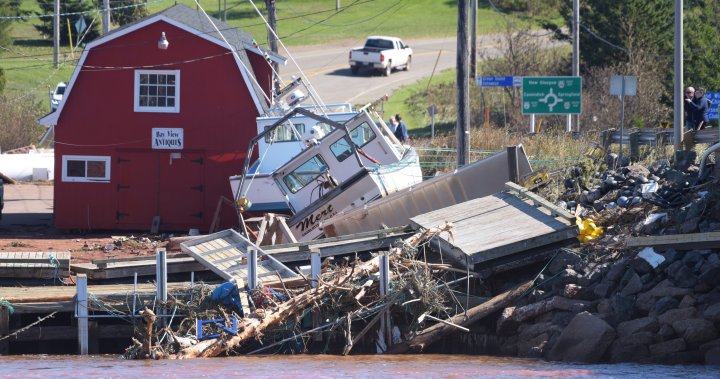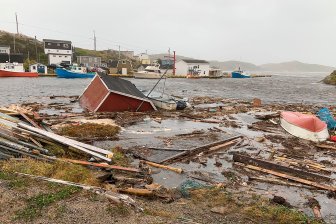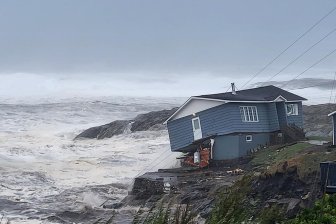[ad_1]
Post-tropical storm Fiona left a trail of devastation on its path through Atlantic Canada this past weekend, leaving homeowners picking up the pieces from damaged roofs, felled trees and flooded homes.
As first responders, Canadian military members and volunteers continue to clear roads and care for the displaced, phones are starting to ring at insurers in the east.
“Insurers are typically the second responders when it comes to large-scale events like this,” says Amanda Dean, vice-president Atlantic for the Insurance Bureau of Canada (IBC).
Read more:
Trudeau says he will visit Atlantic Canada this week after Fiona devastation
Read More
-
Trudeau says he will visit Atlantic Canada this week after Fiona devastation
It will be weeks before the full extent and cost of Fiona’s damage is known, Dean says from her home in Halifax, which, while spared much of the storm’s damage, remains without power Monday like hundreds of thousands of homes in the east.
But while even a ballpark figure remains days away, she says there will be hefty insurance payouts due to the “widespread” impact of the storm — damage was felt in in Nova Scotia, New Brunswick, Prince Edward Island, Newfoundland and eastern parts of Quebec.
“I think we can expect some impressive numbers coming out of this event,” she tells Global News.
What storm damage is covered by insurance?
Don’t bother scanning your insurance policies for “hurricane” or “tropical storm” coverage — these aren’t categories that really exist in the Canadian insurance landscape, says Kelsey Hawke, an expert with rates.ca.
Typical home insurance policies will include coverage for wind damage, Hawke says, which would include debris such as fallen trees and siding torn from a house.

Things get a bit trickier when it comes to water damage, however.
Overland flood — referring to damage caused by rising water levels from a nearby river or other pooling rainwater source — and sewer back-up coverages are usually optional. Check your policy if you have these extra endorsements to see if you’re covered for this type of damage.
IBC notes in a storm round-up post that some homes built in a known flood plain may not be eligible for overland flood protection.
Read more:
Fiona: Southeastern N.B. cleaning up after record flooding brought on by storm
But Hawke and Dean both note that another kind of damage seen in viral videos circulating the past weekend is likely not to be covered.
“Storm surge” impacts, or damage specifically caused by saltwater effects, is not typically offered as a coverage option in Canada, Hawke says.
“So tidal waves, any type of water breaking the banks and damaging the home in that way, saltwater-related, is often excluded on a home insurance policy in Canada,” she says.
One notable exemption is that for automobile policies that have additional comprehensive or all-perils coverage, saltwater or storm-surge damages would likely be included.
But Dean says that some Maritimers who watched metres-high waves crash against the shore and take some or all of their homes into the ocean are likely to be left in the lurch.

“I know we’ve certainly seen some devastating photos and videos and our thoughts are at the forefront with those who have been impacted. But that’s typically not covered under a home insurance policy,” she says.
Those who have been displaced by the effects of the storm or an evacuation order might have coverage for additional living expenses, however, and can be reimbursed for accommodations while waiting for repairs to their homes — homeowners should keep all receipts related to displacement for these claims.
Some politicians have also made pledges to top up financial support for those affected by Fiona.
Read more:
After the storm: residents of Atlantic Canada and eastern Quebec survey damage
Quebec Premier Francois Legault said the province will offer financial help to people who have suffered material losses but says the important thing now is people are safe.
“I still want to reassure Quebecers who live there: we will make sure to have a program to make up the difference, for everything that is not insurable by regular insurance,” Legault said this past weekend.
Prime Minister Justin Trudeau, who plans to visit the affected regions this week, said Monday that his government will work as a “partner” with the provinces and municipalities on topping up financial support but did not provide specifics.
“As we look to rebuilding, as we look to … building stronger infrastructure, as we look to helping families that may have had no or only partial insurance, governments of all stripes are going to be stepping up and the federal government will be there alongside,” he said.
How long will it take to process my claim?
Homeowners hoping for a quick payout and resolution after the storm might be disappointed.
Dean says insurers are expecting “heavy call volumes” in the days to come, but encourages residents to be patient and try again if they hit a busy signal.
While the general advice is to call as early as possible and with photos or itemized inventories to document the damage, Dean says there’s no set timeline that claims have to be filed and some in the Atlantic provinces might need longer to assess their situation.

“If somebody is very overwhelmed at this point in time and just calling is a bit too much, just a couple of days out from the event, by all means, take your time, take a breath and then call when you can again,” she says.
“The sooner you do call, the sooner your claim can start and the sooner an adjuster can be assigned.”
Hawke says that as insurers attempt to triage claims from a massive disruption like Fiona, they’ll likely prioritize addressing clients with the most severe damage.
Will my insurance premiums rise because of Fiona?
Just as some insurers might be busier than others in Fiona’s wake, experts say changes to your insurance rates in the months after the storm will vary depending on your provider.
Hawke notes that anyone with a claims-forgiveness policy on their coverage plan will see their rates protected after making an initial claim.
Dean says that one adverse weather event “doesn’t necessarily impact premiums severely.”
Read more:
How will insurance companies manage as climate risks get worse?
But she notes that the more claims there are coming from a jurisdiction, the more it will eventually cost for that kind of coverage.
“At a certain point, premiums do have to increase because claims are increasing. So that remains to be seen as we work our way through this process,” she says.
Fiona is just the latest incident bringing insurance costs for weather-related incidents into focus.
Dean says home insurance claims have ballooned “especially due to severe weather” in the past few decades, hitting about $2.2 billion last year in claims. A decade earlier, IBC said weather-related claims averaged just over $600 million.
“Our industry is working to keep track of those trends,” Dean says.
— with files from Global News’s Aaron D’Andrea, Amanda Connolly and The Canadian Press

© 2022 Global News, a division of Corus Entertainment Inc.
[ad_2]
Source link












